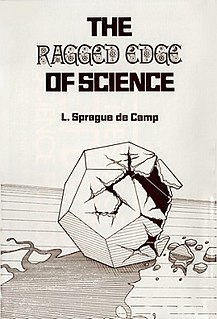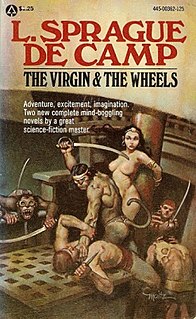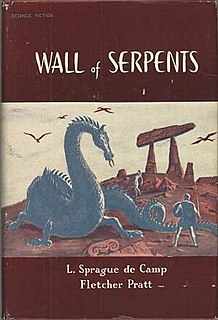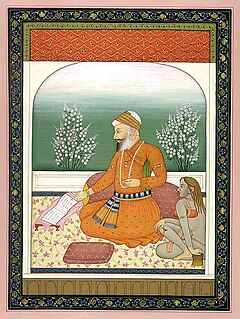Plot summary
Biochemist Homer Osborn of the San Antonio branch of the Federal Research Laboratories has been working on a formula for synthetic beef. While not as good as actual beef, it may prove lucrative for his employer, as beef consumption has been prohibited by the Assembly of the Federation of Democratic and Libertarian States, which includes both the U.S. and India. As representation in the assembly is by population, the cow protectionist Indian majority forced through an anti-vaccacide law and made it mandatory on all member states.
The law prohibits "the eating of cattle, which term shall include all animals of the subfamily Bovinae of the family Bovidae , the same comprising kine, buffaloes, bison, zebus, gayals, bantengs, yaks, and species closely related thereto, or any parts of members thereof," as well as "the killing, for any purpose whatever, and the assault, molestation, capture, imprisonment, sale, purchase, possession, transportation, importation into or exportation out of the Federation of Democratic and Libertarian States, or any territory subject to the jurisdiction thereof, for purpose of eating, of cattle." There has been much resistance to this new version of prohibition in the U.S., and "steaklegging," controlled by Mexican cattle kings, is rampant.
Osborn's department head Charles Kenny decides to treat him to the real thing for comparative purposes, so under the pretense of fishing, the two row out into the wetlands along the lower Nueces River with a package of contraband steaks, weighted for quick disposal. After they set up their campfire Osborn starts cooking the meat while Kenny goes for firewood. While the latter is away, the law arrives in the form of Guja Singh, a towering Sikh of the Fodals or Border Patrol, who arrests Osborn and escorts him toward his patrol car. Guja is the son of prominent Indian politician Arjan Singh.
The bust is in turn busted, however, when both captor and captive are ambushed and abducted by cattle-runners. Osborn soon realizes these are no local steakleggers, but agents of one of the Big Three Mexican cattle kings who control much of the illicit beef traffic into the U.S. Sure enough, Osborn and Singh are taken to the secret compound of Harmodio Dualler, one of the three, in Mexico's Bolsóm de Mapimí. There they meet the "critter king," who sees in Osborn's work potential competition. Dismissing protestations that the labs' synthetic protein cannot possibly compete with real beef, Dualler demands of him all his samples, notes and writings, on pain of death. The Sikh he is initially unsure what to do with, deeming it dangerous to either kill, keep or release him.
The prisoners are incarcerated until nightfall, when they are brought out to eat with their captors. As the meal consists of steak, Guja protests it is against his beliefs to eat it, until assured it is some of Osborn's synthetic beef. Osborn, however, realizes it's too good to be synthetic, and after they eat lets Guja know the steakleggers have fooled him. Guja tries to fight but quickly despairs and gives up, convinced he is ruined. Dualler informs him it's a ploy to ensure he won't make trouble after his release; the meal has been filmed for purposes of blackmail.
Later, back in their cells, Guja passes Osborn a pistol he had concealed in his turban, which the steakleggers didn't think to search. Having heard their captors plotting to kill Osborn after obtaining his secrets, lest he later replicate his work, the Sikh feels one of them should have a chance. For his own part, he attempts to hang himself, but is caught and prevented.
The next day Osborn is taken to Dualler's communication room, where the latter has him make a television call to Charley Kenny's office to have his work delivered to the cartel. But once the connection is made, Osborn presses Guja's pistol into his captor's ribs and orders the Sikh brought in. He apprises Kenny of the situation and directs him to switch the call to Arjan Singh in Delhi. Once Guja is present, Osborn ascertains from him the number of votes his father controls in the Assembly, and confirms it is enough to secure the repeal of the anti-vaccacide law currently before that body. Then he forces Dualler to demand Arjan Singh swing the debate in return for Guja's life. Conscious of their family honor, neither Arjan nor Guja buckles to the threat—until the blackmail film is brought up. Arjan breaks down and agrees.
Realizing his enterprise is doomed if the anti-vaccacide law is repealed, Dualler suddenly grapples with Osborn, who, unable to shoot, flips his pistol to Guja. Guja dispatches Dualler and the two prisoners start a fire in the communications room, after which they burst out, proclaiming the communications apparatus has exploded and injured the critter king. In the ensuing confusion Osborn and Guja sneak from the compound, steal a truck, and make their escape.
Later they arrive at the labs in San Antonio, where Kenny informs them the repeal act has passed. The bewildered Guja Singh finds himself a hero due to his father's pivotal role in the vote, while Osborn, now that there is no need for his synthetic beef, prepares to shake the dust of San Antonio from his feet and return to his native Brooklyn.
Reception
August Derleth characterized the story as "fast-action, slangy, whacky." [3]
P. Schuyler Miller noted that "The Contraband Cow" "offers thoughts on the possible consequences of a world government in which lobbying has not been eliminated as the principal directive of legislation." [4]
John K. Aiken criticized the tale as "definitely thin," "a flippant treatment" of "the undermining of a despotic sway" that "in its original magazine matrix sparkled with a lustre of humour and humanity which, it now appears, derived a good deal from the contrast with its surroundings." Without this setting he found it "too superficial to be really entertaining," feeling that "[i]n the shorter length, there is no time for Mr. de Camp to block in his detail enough to make creditable his rather irresponsible ideas." [5]
Loay H. Hall notes that "[d]espite de Camp's tongue-in-cheek claim in the foreword to The Wheels of If (Shasta, 1948) that he does not write satire, there is little doubt that ... "The Contraband Cow" [is] intended to be satire." [6]
Earl Terry Kemp summed it up as "future irony," finding it "humorous on the whole, ... with excellent ideas." He praised de Camp as having "a freshness of approach and an irrepressible sense of humor—ranging from subtle humorous overtones to broad slapstick burlesque—which enliven his stories, and he has rightfully been regarded as a master in blending fantastic themes with rib-tickling situations." [7]

Gurū Hargobind, revered as the sixth Nānak, was the sixth of ten Gurus of the Sikh religion. He had become Guru at the young age of eleven, after the execution of his father, Guru Arjan, by the Mughal emperor Jahangir.

The Arrows of Hercules is an historical novel by American writer L. Sprague de Camp, first published in hardback by Doubleday in 1965 and in paperback by Curtis Books in 1970. The book was reissued with a new introduction by Harry Turtledove as a trade paperback and ebook by Phoenix Pick in April 2014. It is the fourth of de Camp's historical novels in order of writing, and second chronologically, set in the time of Dionysios I of Syracuse at the end of the 5th and beginning of the 4th centuries BC.

The Ragged Edge of Science is a science book by L. Sprague de Camp, illustrated by Don Simpson. It was first published by Owlswick Press in 1980.

The Wheels of If and Other Science Fiction is a 1948 collection of science fiction stories by L. Sprague de Camp, first published in hardback by Shasta and in paperback by Berkley Books in 1970. It has also been translated into German. All the stories were originally published in the magazines Astounding Science Fiction and Unknown.

The Virgin & the Wheels is a collection of two short science fiction novels by L. Sprague de Camp, published in paperback by Popular Library in 1976. An E-book edition was published by Gollancz's SF Gateway imprint on September 29, 2011 as part of a general release of de Camp's works in electronic form.

Conan of Aquilonia is a collection of four linked fantasy short stories by American writers L. Sprague de Camp and Lin Carter featuring Robert E. Howard's sword and sorcery hero Conan the Barbarian. The stories were originally published in Fantastic in August 1972, July 1973, July 1974, and February 1975. The collected stories were intended for book publication by Lancer Books, but this edition never appeared due to Lancer's bankruptcy, and the first book edition was issued in paperback by Ace Books in paperback in May 1977. It was reprinted by Ace in July 1981, April 1982, November 1982, August 1983, July 1984, 1986, June 1991, and April 1994. The first British edition was published by Sphere Books in October 1978, and reprinted in July 1988. The book has also been translated into French.

Conan of Cimmeria is a collection of eight fantasy short stories written by Robert E. Howard, L. Sprague de Camp and Lin Carter featuring Howard's sword and sorcery hero Conan the Barbarian. Most of the stories were originally published in various fantasy magazines. The book was first published in paperback by Lancer Books in 1969, and reprinted in 1970, 1972 and 1973. After the bankruptcy of Lancer, publication was taken over by Ace Books. Its first edition was published in May 1977, and was reprinted in August 1977, 1979, 1980, 1982 (twice), 1984, 1985, 1990 and 1993. The first British edition was published by Sphere Books in 1974, and was reprinted in 1976 and 1987. The book has also been translated into German, Japanese, Spanish, Dutch, Swedish and Italian. It was gathered together with Conan and Conan the Freebooter into the omnibus collection The Conan Chronicles.

The Pusadian series is a sequence of fantasy stories by L. Sprague de Camp, begun in the early 1950s and written under the influence of Robert E. Howard's Conan stories. The series, also known as the Poseidonis series, prefigured the numerous sword & sorcery settings of the 1960s and 1970s.

The Wolf Leader is an English translation by Alfred Allinson of Le Meneur de loups, an 1857 fantasy novel by Alexandre Dumas. Allinson's translation was first published in London by Methuen in 1904 under the title The Wolf-Leader; the first American edition, edited and somewhat cut by L. Sprague de Camp and illustrated by Mahlon Blaine, was issued under the present title by Prime Press in 1950. The text was also serialized in eight parts in the pulp magazine Weird Tales in the issues for August 1931 to March 1932.
Followers of Sikhism do not have a preference for meat or vegetarian consumption. There are two views on initiated or "Amritdhari Sikhs" and meat consumption. "Amritdhari" Sikhs can eat meat ."Amritdharis" that belong to some Sikh sects are vehemently against the consumption of meat and eggs.

Bandi Chhor Divas is a Sikh celebration that commemorates the day the sixth Guru of Sikhs, Guru Hargobind ji released 52 kings from Gwalior Fort, who had been imprisoned by Mughal Emperor Jahangir. Emperor Jahangir had held 52 kings at the Gwalior Fort for several months. A Sikh Gurdwara, Gurdwara Data Bandi Chhor Sahib, is located at the place of the Gurus internment in the Fort. The day falls in autumn and often overlaps with Hindu Diwali, the festival of lights celebrated across Punjab. Historically, from the time of the third Sikh Guru Amar Das, Sikhs and Hindus of the time used the occasion of Diwali, Vaisakhi and other such festivals to congregate at the seat of the Gurus. In the late 20th century, Sikh religious leaders and the Shiromani Gurdwara Parbandhak Committee formally adopted this day into the Nanakshahi calendar in 2003, under President Prof. Kirpal Singh Badungar the then-president of Shiromani Gurdwara Parbandhak Committee.

"The Animal-Cracker Plot" is a science fiction short story by American writer L. Sprague de Camp, a story in his Viagens Interplanetarias series. It is the second (chronologically) set on the planet Vishnu, and the first to feature the interstellar con-man Darius Koshay. It was first published in the magazine Astounding Science-Fiction in the issue for July, 1949. It first appeared in book form in the collection The Continent Makers and Other Tales of the Viagens, published in hardcover by Twayne Publishers in 1953, and in paperback by Signet Books in 1971. The story has been translated into Portuguese, Dutch, and Italian.

"The Galton Whistle" is a science fiction short story by American writer L. Sprague de Camp, a story in his Viagens Interplanetarias series. It is the first (chronologically) set on the planet Vishnu. It was first published, as "Ultrasonic God," in the magazine Future Combined with Science Fiction Stories in the issue for July, 1951. It first appeared in book form under the present title in the collection The Continent Makers and Other Tales of the Viagens, published in hardcover by Twayne Publishers in 1953, and in paperback by Signet Books in 1971. It also appeared in the anthologies Novelets of Science Fiction, The Good Old Stuff, and The Good Stuff. The story has been translated into Portuguese, Dutch, and Italian.

"The Witch of the Mists" is a fantasy short story by American writers L. Sprague de Camp and Lin Carter, featuring the fictional sword and sorcery hero Conan the Barbarian created by Robert E. Howard. It was first published in the August 1972 issue of the magazine Fantastic, and in book form by Ace Books in the paperback collection Conan of Aquilonia in May 1977. The first British edition was published by Sphere Books in October 1978.

"The Gnarly Man" is a science fiction story by American writer L. Sprague de Camp, about an apparently immortal Neanderthal Man surviving into the present day.

The Wall of Serpents is a fantasy novella by American science fiction and fantasy authors L. Sprague de Camp and Fletcher Pratt. The fourth story in their Harold Shea series, it was first published in the June 1953 issue of the fantasy pulp magazine Fantasy Fiction. It first appeared in book form, together with its sequel, "The Green Magician", in the collection Wall of Serpents, issued in hardcover by Avalon Books in 1960; the book has been reissued by a number of other publishers since. It has also been reprinted in various anthologies and collections, including Great Short Novels of Adult Fantasy I (1972), The Complete Compleat Enchanter (1989), and The Mathematics of Magic: The Enchanter Stories of L. Sprague de Camp and Fletcher Pratt (2007). It has been translated into Italian and German.

Cattle slaughter, especially cow slaughter, is a controversial topic of religion in India, because of cattle's traditional status as an endeared and respected living being to adherents of Hinduism, Jainism, Buddhism, Sikhism and Parsi-Zoroastrianism, while being an acceptable source of meat for Muslims, Christians, and Jews, as well as the adherents of other non-Dharmic religions, such as Animists and Irani Zoroastrians. Cow slaughter has been shunned for a number of reasons, specifically because of the cow's association with the god Krishna in Hinduism, and because cattle have been an integral part of rural livelihoods as an economic necessity. Cattle slaughter has also been opposed by various Indian religions because of the ethical principle of Ahimsa (non-violence) and the belief in the unity of all life. Legislation against cattle slaughter is in place throughout most states and territories of India.

Guru Arjan was the first of the two Gurus martyred in the Sikh faith and the fifth of the ten total Sikh Gurus. He compiled the first official edition of the Sikh scripture called the Adi Granth, which later expanded into the Guru Granth Sahib.

"The Merman" is a science fiction story by American writer L. Sprague de Camp, based on the concept of human biological engineering. It was first published in the magazine Astounding Science-Fiction for December, 1938. It first appeared in book form in the collection The Wheels of If and Other Science Fiction ; it later appeared in the anthology Science Fiction of the Thirties and the collection The Best of L. Sprague de Camp. The story has been translated into German

"The Hibited Man" is a classic science fiction short story by L. Sprague de Camp. It was first published in the magazine Thrilling Wonder Stories for October, 1949. It first appeared in book form in the hardcover anthology My Best Science Fiction Story. It has also appeared in the paperback anthology The Shape of Things.



















